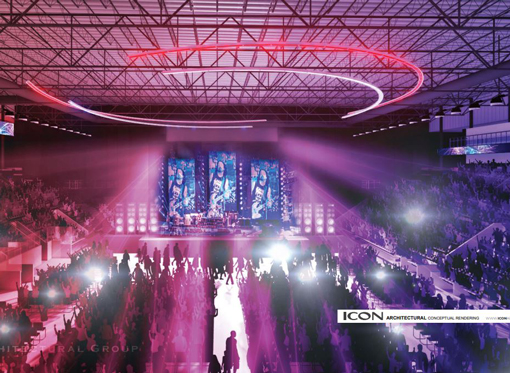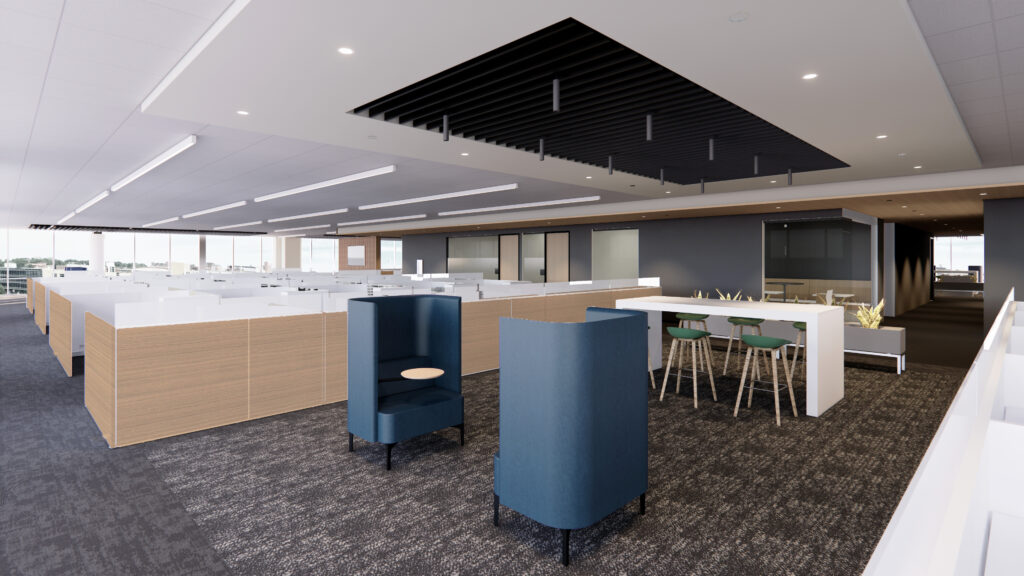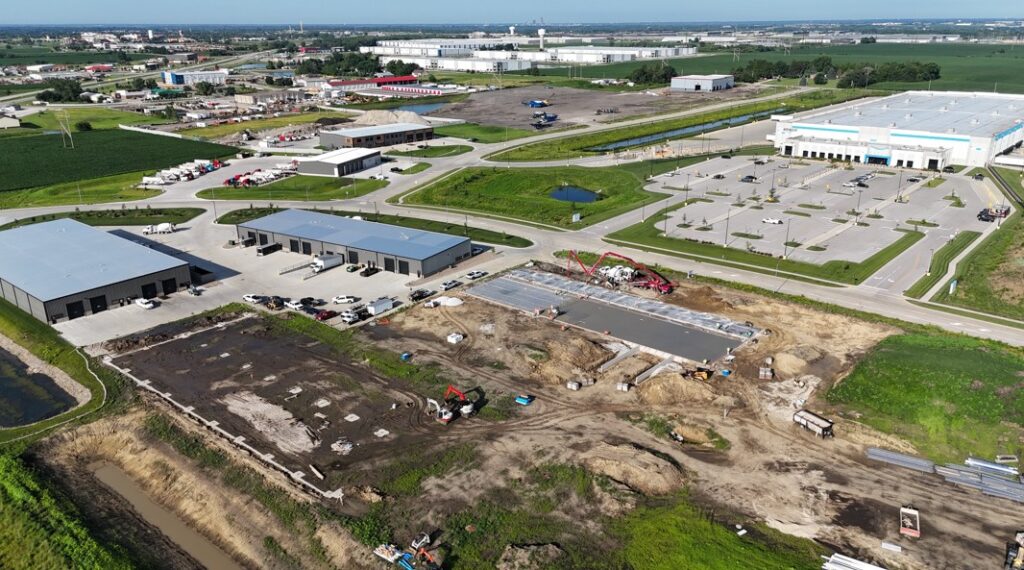From department store to multiuse arena
How an email set in motion a proposal to transform empty department store space into an arena for hockey, concerts and other uses

KATHY A. BOLTEN Dec 17, 2020 | 7:01 pm
10 min read time
2,448 wordsBusiness Record Insider, Real Estate and Development
2018 was brutal to Merle Hay Mall.
Within a 47-day span, the northwest Des Moines regional shopping center lost its two longtime anchor tenants: Younkers in late August of 2018; Sears in mid-October. Both were original tenants of the mall, which opened in 1959 at Merle Hay Road and Douglas Avenue and quickly became Central Iowa’s preeminent place to shop.
The stores’ closures left Merle Hay Mall with gaping, vacant spaces. Sears had anchored the shopping center’s north end, and Younkers the southwest corner. Elizabeth Holland, the mall’s owner, knew that without well-known, major tenants to draw customers to the mall, the center risked losing other stores as well.
But how do you fill nearly 400,000 square feet of retail space at a time when thousands of retailers were shuttering their doors? In 2017, record 8,000-plus retailers closed, a trend that continued into 2018 as competition grew from big-box and discount fashion stores and the e-commerce industry.
Analysts had begun predicting that by the mid-2020s, 1 in 4 U.S. shopping malls would be permanently closed.
Holland, whose grandfather and another man developed Merle Hay Mall, didn’t want the center to become a statistic.
So when a local real estate broker reached out to her a few days after Sears closed, the message sparked a kernel of hope.
“I wanted to connect you with a friend of mine, Nate Teut, who is president of the Des Moines Buccaneers hockey club,” Christopher Stafford, a broker with Cushman & Wakefield commercial real estate firm and Teut’s friend, wrote Holland. “Nate and I were talking this morning regarding the potential opportunities at Merle Hay Mall. … I thought it would be beneficial to connect the two of you sooner than later.”
Holland recalled thinking, “‘Absolutely, let’s meet.’ There was no hesitation on my part.”
And why would there be? Mall owners across the country had begun filling empty spaces with unconventional tenants. In Idaho, a former Sears store was converted to space for a charter school. An upstate New York shopping center was converted into a senior living facility with an adult day care. Other malls had turned unused space into warehouses to support e-commerce. In Mason City, a former J.C. Penney department store was being transformed into a multipurpose arena with an NHL-sized ice rink.
Holland, too, had found ways to attract more people to Merle Hay Mall.
About eight years ago, she landed an agreement with Flix Brewhouse to bring its then-new business concept of a combination movie theater-brewery-restaurant to Des Moines. Merle Hay Mall was the Texas-based business’s second location, which opened at the shopping center in 2014. More recently, GameDay, which features an arcade, restaurant and bar, opened in the mall.
Holland and mall leasing manager Jared Hassman met Teut and Michael Devlin, a managing partner in the Buccaneers ownership team, at the mall and talked for more than an hour as they walked through the former Younkers department store.
“We talked about what it could be and how it would work,” Holland said.
In mid-November, Holland announced that the mall space where three department stores had been located – Montgomery Ward, Famous-Barr and then Younkers – would become a 3,500-seat multipurpose arena and the new home of the Des Moines Buccaneers hockey team. A 150-room hotel is also planned, the announcement said.
“We’re not leading the trend of this kind of use in enclosed shopping centers,” Holland said. “We’re part of the trend.”
Buccaneers’ arena needs
Orchard View Sports and Entertainment gained approval from the U.S. Hockey League to buy the Des Moines Buccaneers in November 2017. Not long after that, the team’s new owners began exploring possibly building a new arena.
“We realized that the 60-year-old facility that we were in was pretty inadequate to handle a tier one USHL hockey team,” said Devlin, a managing partner with Orchard View Sports. “It’s a great, unique arena and it has some good history. It just didn’t have what you needed to develop players and grow the sport in this area.”
The arena opened in 1961 at 7201 Hickman Road in Urbandale. The 38,556-square-foot building was originally called the Des Moines Ice Arena and then Metro Ice Sports Arena. The Des Moines Oak Leafs and Des Moines Capitals hockey teams played at the arena before it became home to the Buccaneers in 1980.
The arena is used heavily on a daily basis. When the Buccaneers aren’t playing or practicing, youth and adult hockey teams are on the ice or figure skaters are practicing and getting lessons. It’s not unusual for the arena to be in use from 6 a.m. to midnight, particularly on weekends, Devlin said.
Even with the addition of a new arena with two sheets of ice in West Des Moines, Central Iowa needs more ice to accommodate the demand from groups and individuals as well as to begin hosting youth hockey tournaments, he said.
For a short period, Buccaneers owners considered converting the building that previously housed the discount retailer Kmart into a new arena. The property, located next door to the hockey team’s current facilities on Hickman Road, became available in spring 2018 after Kmart’s parent company closed dozens of stores nationwide when it filed for bankruptcy.
“It became pretty obvious that it was something we should look at, and we did,” Devlin said.
The site, though, didn’t work out. Having multiple sheets of ice in the facility would have been a difficult feat to accomplish. In addition, there weren’t enough amenities in the area to support the programming planned for a new arena, Devlin said. The team envisioned sponsoring youth hockey tournaments, which meant having nearby activities for team members and their families when they weren’t on the ice.
Devlin said the team also considered building a new facility, but decided it was too expensive after exploring the costs.
Members of the Buccaneers organization continued looking at options. While staying in Urbandale was preferable, they didn’t want to close the door to other options, Devlin said. However, none of the properties they considered met all the criteria required by Buccaneers owners.
Shortly after Younkers closed, someone asked Devlin if he’d considered the vacant Merle Hay space.
“Nate [Teut] and I jumped in the car and drove over to Merle Hay,” Devlin said. “We drove around it and I said, ‘Yeah, that almost looks like an arena.’”
How the project evolved
Teut, the Buccaneers president, and Stafford, of Cushman & Wakefield, have been friends for several years. Frequently when they got together in 2018 their conversation turned to discussing a new hockey arena for the Buccaneers.
“In this business, conversations and connections are important,” Stafford said. “We had talked about Merle Hay. I offered to reach out to Liz [Holland], who I know and have a lot of respect for. I sent her the email … and that was the first step in getting the conversation started between the two stakeholders.”
Stafford’s years in real estate have shown him the importance for mall owners to repurpose retail space in ways that attract consumers, who increasingly have turned to e-commerce for many of their purchases.
“Malls are typically located on really good real estate and in densely populated neighborhoods, which is certainly true with Merle Hay,” Stafford said. “It’s become even more important now to find creative opportunities to reuse and redevelop malls. … Liz and her team knew that way before 2018 when this introduction happened. They were on the cusp of understanding retail was shifting.”
Holland responded to Stafford’s email the same afternoon she received it.
“Hi Christopher and Nate – I hope you are doing well. I would welcome the opportunity to discuss your ideas regarding Merle Hay. Please let me know what works best for you guys. …”
A week or so later, Holland, Teut and Devlin were walking through the vacant department store space.
Initially, discussions involved developing an arena with two sheets of ice. But as talks progressed, it became clear Central Iowa could support more ice even with the two sheets planned at the MidAmerican Energy Company RecPlex in West Des Moines.
The group landed on developing an arena with four sheets of ice, bringing the total in the Des Moines area to six.
“That’s really going to help the Des Moines youth hockey market and their program,” Teut said. “You can’t grow your hockey numbers without more ice.”
This week, a master plan was released that shows the proposed multiuse stadium stretching from the former Younkers site into an area now occupied by Kohl’s department store. The arena and proposed hotel would take up the entire west side of the mall, the master plan shows.
Raising the roof
As the Buccaneers staff talked with Holland, they also reached out to architects about converting the former department store space into an arena. A couple of them talked about razing the two-story structure and rebuilding on the site, an expensive idea, Devlin said.
Devlin and Teut heard about the Mason City hockey arena that was developed in former department store space and reached out to the architect firm involved in the project, Icon Architectural Group, which is headquartered in Grand Forks, N.D. The two connected with Mike Kuntz, a principal in the firm.
“The building still has good bones and the infrastructure is in place,” Kuntz said. “We as a company like to find ways to reuse structures rather than tearing them down and throwing them in the dump. Or, just as bad, letting a building sit there for five, 10, 15 years waiting for the right reuse to come along.”
The cost to redevelop the former Younkers space has not been released. However, Kuntz estimated costs will run 30% to 40% less to redevelop the building than building new.
In Mason City, workers dug about 6 feet into the ground to create the arena, which opened in late 2019. The opposite will occur at the Merle Hay space, where the roof will be raised, Kuntz said. “We’ll do that to get that volume you need in an arena.”
Bringing two cities to the table
Merle Hay Mall straddles the boundary lines of two cities: Des Moines and Urbandale. While the majority of the mall is in Des Moines, the proposed arena site is in Urbandale.
The Buccaneers team met first with Urbandale officials and then brought in Des Moines.
“After that initial meeting, we sat back and thought, ‘Gosh, this could be what Merle Hay needs to really reposition itself to be more than a place to get back-to-school clothes,’” Curtis Brown, Urbandale’s assistant city manager and economic development director, said.
To make the project work, Urbandale and Des Moines officials must work together to create a special district so that the project would be eligible for money through the Iowa Reinvestment Act. City officials must also be in agreement on details that will be included in site and building plans submitted by the developer.
“That’s a hurdle we haven’t had to go through with other developments,” said Aaron DeJong, Urbandale’s assistant director of
economic development. “A lot of developers might back away from having to go through two different cities with two different sets of rules and two different processes.
“It just doesn’t happen that often.”
Officials from the two cities, though, work well together and understand how the project will benefit both communities, said Naomi Hamlett, Des Moines’ economic development coordinator.
“This project is going to bring a lot of vitality and excitement to the area,” Hamlett said. “It’s not going to be just a retail destination; it’s going to become an entertainment destination. … A strong Merle Hay Mall is important. It’s an anchor of that entire neighborhood – the Des Moines side and the Urbandale side.”
When the proposed mall master plan was released, concerns were raised about how stormwater would be managed. A Des Moines staff report released with the plan stated that officials from Des Moines and Urbandale were working together to solve stormwater runoff related issues.
Project backers envision the arena sparking a new surge of development in the area. Hockey tournaments are planned in the arena, which means there is a need for nearby amenities to support participants and their families. Additional restaurants will likely be needed in the arena, as will sporting goods and other types of retail stores. When teams aren’t competing, families may want to watch movies, play arcade games or do some other type of activity, Holland said.
And the arena won’t just be for hockey, she said. “You can have concerts there. You can have indoor soccer there. Basketball. Volleyball. … A venue like that will become a destination place.”
‘We really can’t stay here anymore’
By August 2020, Holland, the Buccaneers ownership and management team, and Urbandale and Des Moines’ economic development officials had spent more than 20 months discussing the proposed multipurpose arena project and its financing.
It took time to get everyone involved with the project to see that the idea was feasible and be comfortable with each of the steps that had been taken, Devlin said.
On Aug. 10, Iowa was slammed with a derecho, with measured wind gusts of 126 mph. The storm wreaked havoc on the Buccaneers’ Hickman Road arena, leaving parts of its roof strewn throughout the parking lot and on neighboring properties. The heavy rains that followed the high winds damaged parts of the arena’s interior.
“When the derecho hit, it was like ‘OK, we really can’t stay here anymore,’” Devlin said. “We really needed to make the push and see if this could happen.”a’s hockey programs were paralyzed because of the storm, Teut said. “Without any ice, nobody could do anything. The high school teams couldn’t do anything. The adult teams were paused. … There was nowhere for any of them to go.”
The timeline that arena planners had established was accelerated and in early November, plans for the multipurpose arena were released to the public.
If financing is secured for the project in the first half of 2021, construction could begin by late summer with the project completed by fall or winter of 2022, Holland said.
It takes months — and often years — for all the pieces of a proposed project to be fitted together, said Holland, who will sell the former department store property to the Buccaneers organization. “What you learn from [projects] like this is the best way to be in any life effort is that you have to the Soviet tractor,” she said. “You have to have one forward gear and no reverse gear. You’re not going fast, but you are going forward.
“That’s kind of our business model.”













